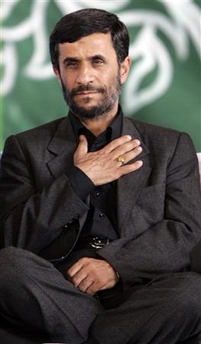EU foreign policy chief Javier Solana will present Iran on Tuesday with
proposals from six world powers aimed at persuading it to rein in a nuclear
program the West fears will lead to it building atomic bombs.

Iranian President
Mahmoud Ahmadinejad bows to his supporters during the anniversary of death
of late leader Ayatollah Ruhollah Khomeini in Tehran June 4, 2006.
[Reuters] |
The package of incentives and penalties is intended to get Tehran to abandon
uranium enrichment. Iran insists it wants the nuclear fuel only for power
plants, not weapons.
The initiative was put together by the three biggest EU states - Britain,
France and Germany and then approved by a forum that also included the United
States, China and Russia.
"The proposal we bring along, the one that we carry, we think that will allow
us to get engaged in that negotiation based on trust and respect and
confidence," Solana told reporters in brief comments at the airport.
An EU diplomat in Tehran, who asked not to be identified, said Solana would
hand the package to chief nuclear negotiator Ali Larijani on Tuesday. Solana is
also due to meet Iranian Foreign Minister Manouchehr Mottaki.
"If their aim is not politicizing the issue, and if they consider our demand,
we can reach a logical agreement with them," Mottaki told reporters shortly
before Solana arrived.
He did not specify Iran's "demand," but Iranian officials have previously
said Iran will not give up uranium enrichment, the package's main requirement.
The United States has said Iran's negative comments so far are probably part
of efforts to stake out a negotiating position and urged careful consideration
by the Islamic Republic, with which it broke off diplomatic ties in 1980.
Mottaki said discussions on the package would require "shuttle diplomacy" and
Iran would have suggestions to make, suggesting no imminent breakthrough.
"After receiving this proposal, Iranian officials will start to review this
proposal and we will give our answer at an appropriate time," he said.
Details of the proposals have not been announced, but diplomats have been
working on themes ranging from offering nuclear reactor technology to giving
security guarantees.
Diplomats in Washington said an arms embargo against Iran was among the
possible sanctions if it rejected the offer.
But they said the six powers had pledged to keep details secret until the
package was shown to Iran. This was so Iran did not feel compelled to reject any
or all of the elements as a face-saving gesture if they were made public first,
they said.
The dispute has unsettled jittery oil markets, where traders fear an
escalation in the dispute could disrupt supplies from the world's fourth largest
oil exporter. The standoff has helped keep oil prices near record levels above
$70 a barrel.
Supreme Leader Ayatollah Ali Khamenei, who has the final word in state
matters, said on Sunday that oil supplies from the region would be in danger if
the United States made a "wrong move" - a veiled threat to use oil as a weapon.
Officials had previously said Iran would not resort to such a measure.
Although the United States insists it wants a negotiated resolution to the
nuclear standoff, U.S. officials have refused to rule out a military option if
diplomacy fails.